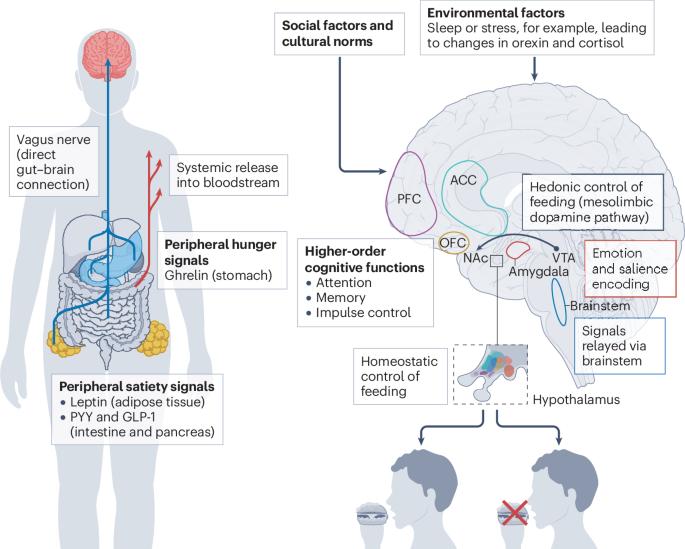Examining the biological causes of eating disorders to inform treatment strategies
IF 26.7
1区 医学
Q1 NEUROSCIENCES
引用次数: 0
Abstract
Despite their prevalence, eating disorders (EDs) are under-researched and often misunderstood. A recent focus of research on the biological underpinnings of EDs has helped to reframe our understanding of their origins, but there remain a lack of effective treatment options, high rates of relapse and, unfortunately, high mortality and morbidity. In this Review, we highlight the many facets of normal and pathological feeding behaviour and body weight regulation and suggest that these provide a framework with which to develop integrative methods to study, and ultimately treat, EDs. We propose that a better understanding of the biological causes of ED, and their crucial interactions with psychological and environmental factors, is necessary to progress the field. This can be achieved through a combination of preclinical and clinical investigations, which provide complementary information on these highly complex disorders. In the era of individualized medicine and with the advent of artificial intelligence tools that allow the amalgamation of multimodal data, we hope that a better understanding of the biology of EDs may hold the answer to effectively overcoming the debilitating effects of these conditions. Recent years have seen a growth in our understanding of the biological drivers of eating disorders and their interactions with environmental and psychosocial factors. Foldi and Griffiths consider how interdisciplinary research, dimensional diagnostic approaches and improved animal models may enable the development of more effective treatments for these disorders.


检查饮食失调的生物学原因,为治疗策略提供信息
尽管饮食失调(EDs)很普遍,但对其研究不足,而且经常被误解。最近对急症生物学基础的研究重点帮助我们重新理解其起源,但仍然缺乏有效的治疗选择,复发率高,不幸的是,死亡率和发病率高。在这篇综述中,我们强调了正常和病理摄食行为和体重调节的许多方面,并建议这些方面为开发综合方法来研究和最终治疗EDs提供了一个框架。我们建议,更好地了解ED的生物学原因,以及它们与心理和环境因素的重要相互作用,对该领域的发展是必要的。这可以通过临床前和临床研究的结合来实现,这为这些高度复杂的疾病提供了补充信息。在个体化医疗的时代,随着人工智能工具的出现,允许合并多模态数据,我们希望更好地了解ed的生物学,可能会有效地克服这些疾病的衰弱影响。
本文章由计算机程序翻译,如有差异,请以英文原文为准。
求助全文
约1分钟内获得全文
求助全文
来源期刊

Nature Reviews Neuroscience
NEUROSCIENCES-
自引率
0.60%
发文量
104
期刊介绍:
Nature Reviews Neuroscience is a multidisciplinary journal that covers various fields within neuroscience, aiming to offer a comprehensive understanding of the structure and function of the central nervous system. Advances in molecular, developmental, and cognitive neuroscience, facilitated by powerful experimental techniques and theoretical approaches, have made enduring neurobiological questions more accessible. Nature Reviews Neuroscience serves as a reliable and accessible resource, addressing the breadth and depth of modern neuroscience. It acts as an authoritative and engaging reference for scientists interested in all aspects of neuroscience.
 求助内容:
求助内容: 应助结果提醒方式:
应助结果提醒方式:


